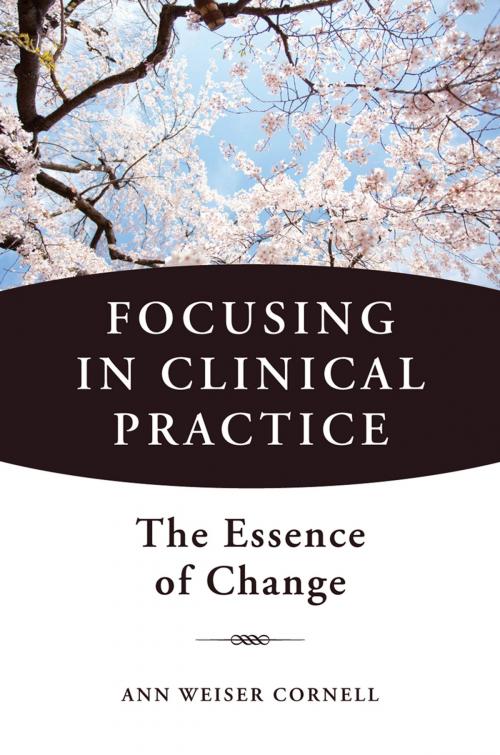Focusing in Clinical Practice: The Essence of Change
Nonfiction, Health & Well Being, Psychology, Counselling| Author: | Ann Weiser Cornell | ISBN: | 9780393708820 |
| Publisher: | W. W. Norton & Company | Publication: | August 5, 2013 |
| Imprint: | W. W. Norton & Company | Language: | English |
| Author: | Ann Weiser Cornell |
| ISBN: | 9780393708820 |
| Publisher: | W. W. Norton & Company |
| Publication: | August 5, 2013 |
| Imprint: | W. W. Norton & Company |
| Language: | English |
A therapy technique for inner awareness and meaningful change.
“Focusing” is a particular process of attention that supports therapeutic change, a process that has been linked in more than 50 research studies with successful outcomes in psychotherapy. First developed by pioneering philosopher and psychotherapist Eugene Gendlin, Focusing quietly inspired much of the somatically oriented, mindfulness-based work being done today. Yet what makes Focusing a truly revolutionary approach to therapeutic change has been little understood—until now.
Focusing is based on a radically different understanding of the body as inherently meaningful and implicitly wise. Mere intellectualizing or talking about problems can keep clients stuck in their old patterns of behavior. Focusing introduces the concept of the “felt sense,” a moment in process when there is a potential to experience more than is already known and to break through old, frozen, stuck patterns. Clients who see real change during the course of their therapy work are often those who can contact and stay with a felt sense—but how to help them do so is not obvious.
Ann Weiser Cornell, who has been teaching Focusing to clinicians for more than 30 years, shows how to help clients get felt senses and nurture them when they appear, how to work with clients who have difficulty feeling in the body, how to facilitate a “felt shift,” how to support clients who experience dysregulating emotional states, and much more. Beginning with a clear explanation of what makes Focusing so potentially transformative, she goes on to show how to effectively incorporate Focusing with other treatment modalities and use it to treat a range of client issues, notably trauma, addiction, and depression.
Designed to be immediately applicable for working clinicians and filled with practical strategies, clinical examples, and vignettes, this book shows step by step how to bring Focusing into any kind of clinical practice. Cornell expertly demonstrates the Focusing process unfolding, moment by moment, in the therapy room, and illuminates its powerful capacity to support a client’s growth and change.
A therapy technique for inner awareness and meaningful change.
“Focusing” is a particular process of attention that supports therapeutic change, a process that has been linked in more than 50 research studies with successful outcomes in psychotherapy. First developed by pioneering philosopher and psychotherapist Eugene Gendlin, Focusing quietly inspired much of the somatically oriented, mindfulness-based work being done today. Yet what makes Focusing a truly revolutionary approach to therapeutic change has been little understood—until now.
Focusing is based on a radically different understanding of the body as inherently meaningful and implicitly wise. Mere intellectualizing or talking about problems can keep clients stuck in their old patterns of behavior. Focusing introduces the concept of the “felt sense,” a moment in process when there is a potential to experience more than is already known and to break through old, frozen, stuck patterns. Clients who see real change during the course of their therapy work are often those who can contact and stay with a felt sense—but how to help them do so is not obvious.
Ann Weiser Cornell, who has been teaching Focusing to clinicians for more than 30 years, shows how to help clients get felt senses and nurture them when they appear, how to work with clients who have difficulty feeling in the body, how to facilitate a “felt shift,” how to support clients who experience dysregulating emotional states, and much more. Beginning with a clear explanation of what makes Focusing so potentially transformative, she goes on to show how to effectively incorporate Focusing with other treatment modalities and use it to treat a range of client issues, notably trauma, addiction, and depression.
Designed to be immediately applicable for working clinicians and filled with practical strategies, clinical examples, and vignettes, this book shows step by step how to bring Focusing into any kind of clinical practice. Cornell expertly demonstrates the Focusing process unfolding, moment by moment, in the therapy room, and illuminates its powerful capacity to support a client’s growth and change.















